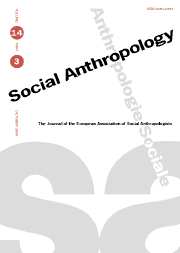No CrossRef data available.
Article contents
Hinduism. None, one or many?
Published online by Cambridge University Press: 13 December 2004
Extract
Caldwell, Sarah. 1999 [Oxford India Paperbacks 2001]. Oh terrifying mother. Sexuality, violence and worship of the goddess Kali. New Delhi: Oxford University Press. xvii + 320 pp. Pb.: 495Rs. ISBN: 019 565 7696.
Flood, Gavin (ed.). 2003. The Blackwell companion to Hinduism. Oxford: Blackwell. xiv + 599 pp. Hb.: £85.00. ISBN 0 631 21535 2.
Michaels, Axel. 2004. Hinduism, past and present (translated by Barbara Harshav). Princeton: Princeton University Press. xviii + 430 pp. Hb.: £42.95. Pb.: £12.95. ISBN 0 691 08952 3/08953 1.
Smith, David. 2003. Hinduism and modernity. Oxford: Blackwell. xii + 250 pp. Hb.: £50.00. Pb.: £15.99. ISBN 0 631 20861 5/20862 3.
Anthropologists of Buddhism are familiar with descriptions of Buddhists in which the author wonders whether what they are observing is ‘really’ Buddhism. In the case of Hinduism, confronted close up, the dominant attitude is more likely to be fascination. If observers of Hindu rituals rub their eyes, it is not usually because they are stricken by epistemological doubt about the very status of what they are observing. Scepticism about Hinduism tends rather to be meta-doubt, doubt experienced by theorists trying to grapple with the task of providing an overall picture of Hinduism, doubt about whether there is such a thing as Hinduism in the larger sense at all. In short, with Buddhism the assumption seems to be: it does exist, but village Buddhism isn't really it. In the case of Hinduism the ontology is the other way around: Hinduism certainly exists in villages, but does it exist as an institution spanning millennia and the whole of South Asia? In the past some Panjabis returned their social identity as ‘Hindu Mussalman’ in the census. Many Sikhs, Buddhists and Jains used to be happy to be considered as a variety of Hindu, and some still so consider themselves today. Others describe themselves as ‘secular Hindus’. In other words, Hindu in this sense means approximately ‘Indian’ (though sorting out that historical and conceptual conflation is precisely the problem). Thus some influential scholarly voices have recently argued that really there is no such thing as Hinduism, and that, even if Buddhism, Christianity, Islam and the rest exist as separate religions, Hinduism does not. It contains several religions within it perhaps, but it is not itself a religion.
- Type
- Review Article
- Information
- Copyright
- © Cambridge University Press 2004


